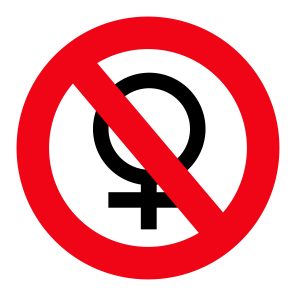 Many Traditionalists are totally opposed to the ordination of women. Compassionates unconditionally support the ordination of women. Neither seem amenable to any position in a middle ground. I’m not sure I inhabit that middle ground, either. But I don’t find the situation quite as simple as those two alternatives. I don’t even think that the denomination’s position on the ordination of women — either way–deals with the real problem congregations face today.
Many Traditionalists are totally opposed to the ordination of women. Compassionates unconditionally support the ordination of women. Neither seem amenable to any position in a middle ground. I’m not sure I inhabit that middle ground, either. But I don’t find the situation quite as simple as those two alternatives. I don’t even think that the denomination’s position on the ordination of women — either way–deals with the real problem congregations face today.
Scripturally, the issue seems pretty simple to me–hear me out. All the energy expended over qualifications for the priesthood in the Old Testament seems pointless to me. As Christians, we believe that the entire OT system passed away, that we have one High Priest. Whatever ordination means today, it does not correspond to priesthood. At least for Protestants, ministers do not mediate salvation to the believer. In sum, I’m not interested in the OT evidence, any more than I need to know what incense to combine with the blood of the sacrifice. We don’t do that any more.
 Secondly, I see no evidence that the gifts of the Spirit enumerated in Romans 12, 1 Corinthians 12, or Ephesians 4, are limited in their distribution by sex. Indeed, Philip’s daughters exhibited the gift of prophecy. And prophecy is one of the ‘best gifts’ Paul wants us to aspire to. Unless there is some other evidence declaring that only men receive the gifts of the spirit, I have to conclude that ‘pastor and teacher’ in Ephesians 4 can be exhibited by a woman.
Secondly, I see no evidence that the gifts of the Spirit enumerated in Romans 12, 1 Corinthians 12, or Ephesians 4, are limited in their distribution by sex. Indeed, Philip’s daughters exhibited the gift of prophecy. And prophecy is one of the ‘best gifts’ Paul wants us to aspire to. Unless there is some other evidence declaring that only men receive the gifts of the spirit, I have to conclude that ‘pastor and teacher’ in Ephesians 4 can be exhibited by a woman.
Whether that corresponds exactly with what we think of as an ‘ordained minister’ is a different question. In fact, nothing in the scripture corresponds directly with our practice of ordination. And that points to the final reason: ordination among SDA’s originated so that we could distinguish between those actually preaching our doctrines and those who weren’t. We, as a denomination, invented this particular type of ordination. So if we invented it, we can change it.
So I see nothing in scripture or in church doctrine that prohibits the ordination of women. Not prohibiting, of course, is not the same as promoting. And here’s where I get into difficulty.
First, I think that there are many situations and many ministries where an ordained woman would be invaluable and necessary.
 But there’s another side to this. As Donald Joy and others have pointed out, our churches have become increasingly feminized, places where men do not feel comfortable. And this becomes obvious when looking at statistical data. Women outnumber men in every denomination, including our own, and not by a slight measure. Having a woman pastor for a congregation made up predominantly of women makes sense in one way, but if it makes the setting less hospitable for men and boys, it might not be wise.
But there’s another side to this. As Donald Joy and others have pointed out, our churches have become increasingly feminized, places where men do not feel comfortable. And this becomes obvious when looking at statistical data. Women outnumber men in every denomination, including our own, and not by a slight measure. Having a woman pastor for a congregation made up predominantly of women makes sense in one way, but if it makes the setting less hospitable for men and boys, it might not be wise.
Put another way, while a woman pastor would be ideal in some situations, she would be a problem in others. Of course, the same is true for a man. In other words, the sex of the pastor isn’t the problem.
As I see it, the problem is the notion that SDA pastors are supposed to be interchangeable; that a man ordained in Aberdeen, SD, will be just as good a pastor in Mumbay, India, or that a woman ordained in Glendale, CA will be just as effective in Papua, New Guinea.
As near as I can tell, we long since abandoned the practice of rotating pastors blindly, without considering where they ‘fit.’ Remember, Peter and Paul decided to split the responsibility, with Peter focusing on the Jews, and Paul on the gentiles.
In line with my last post, I think we should deal with people where they are. Yes, I think that different Divisions should be allowed to go their own way on this. But we should not expect that Kenya, say, will be ready to receive a woman pastor. Pastors are not, and should not be considered interchangeable.
The question isn’t whether we should ordain women and start rotating them through the churches, but whether this congregation would benefit from this pastor, man or woman. There are some congregations where the need for a woman pastor with the right gifts is an aching need. There are others where any woman pastor might exacerbate existing problems. The same is no doubt true for men.
So, do I favor ordaining women? As a political statement, no. But then, I oppose using ordination to make political statements. Are there women with spiritual gifts that a church needs, and should these women be ordained? Yes!
We need spirit-filled men and women ordained to minister to the churches. But we should be more concerned about how that particular pastor enhances the work of the gospel in that church/community than whether the pastor is male or female.








